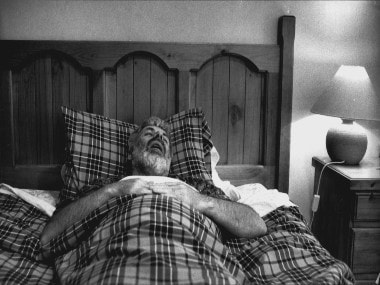Every year, the first Tuesday of May is observed as World Asthma Day. This year, most of our attention has been focused on COVID-19 and with good reason; but that only makes it all the more essential to not ignore the other respiratory problems one may be suffering from. So in the lead up to World Asthma Day, let’s discuss the problem of night-time cough and how it is related to asthma. Asthma is a chronic inflammatory condition of the lungs in which the airway become narrow due to swelling in the mucous membrane (or mucosa). There is also increased production of mucus in the airway. [caption id=“attachment_7963861” align=“alignleft” width=“380”]  Representational image. Image source: Getty Images.[/caption] The symptoms of asthma are wheezing (whistling sound from the chest), shortness of breath, chest tightness and cough that varies over time in occurrence, frequency and intensity. It is usually more severe at night. Night-time or nocturnal cough, commonly seen in asthma, not only results in disturbed sleep but can also disrupt one’s following day. The patient might not be able to do the work properly or concentrate and feel irritated throughout the day. The quality of life is disturbed.
Reasons for night-time cough in asthma patients:
- Asthma itself can be worse during sleep. Though exact reasons remain unknown, some explanations include increased exposure to allergens, cooling of the airways, being in a reclining position, and hormone secretions that follow a circadian pattern.
- Cough variant asthma is a type of asthma characterized only by a dry cough. Cough can occur both during the day and night but may be more severe at night.
- Allergens in the bedroom or on the bedding can trigger cough by irritating hypersensitive airways.
- Acid reflux can be a coexistent problem in asthmatics, leading to night-time cough.
- Night-time cough can be a sign of uncontrolled asthma due to improper or irregular medication.
- The cough may be a sign of an impending asthma attack.
Ways to get relief from night-time cough
- Proper treatment of asthma or cough-variant asthma: Take proper controller medications regularly even when the symptoms appear to be well controlled. Change in medications should only be done in consultation with a pulmonologist.
- Sleeping in a propped up position: Sleeping in this position prevents post nasal drip and acid reflux to some extent.
- Treating acid reflux: Patients should avoid foods that increase acidity. Do not lie down for at least 90 minutes after meals and take medications if required.
- Drinking tea with honey: This soothes the throat, relieves some of the congestion in the throat, loosens the mucus and gives symptomatic relief from cough.
- Humidification of room: 50% humidity with the help of humidifier can help control irritable cough by soothing the airways.
- Decrease allergens: Cleaning and getting rid of the dust from the bedroom can help decrease night-time cough.
- Use saline or decongestant nasal spray: It helps clear the nasal passages of the allergens, irritants and the mucus. This may also decrease postnasal drip.
Although nighttime (nocturnal) cough is commonly seen in asthma, it can be seen in many other diseases as well.
Other possible causes of night-time cough
- Acid reflux (also known as heartburn): Acid reflux happens when some of the acidic stomach content goes back into the oesophagus and causes cough, due to irritation in the throat.
- Post-viral (URI) cough: This is usually experienced after common cold or URI (upper respiratory infection). It causes severe cough with night-time symptoms and occurs due to hypersensitivity of the airways.
- Post-nasal drip: This is commonly observed with cold. Mucus secretions from nose drip down into the throat and irritate the windpipe, resulting in cough. The intensity and frequency increase in the lying-down position, meaning during sleep.
- Smoking: Smoking can also cause irritable dry cough along with breathing issues, which can sometimes become very irritating in the night.
It is important to get night-time cough properly diagnosed and treated, as asthma is only one such disease in which night-time symptoms are common. It can be a symptom of worsening asthma, cough variant asthma or many other illnesses. Adequate treatment not only provides relief from the disease but also improves the quality of life. This article was written by Dr Rajesh Kumar Gupta, Additional Director, Pulmonology, Fortis Hospital, Noida.
For more information, read our article on COVID-19 and Asthma. Health articles in Firstpost are written by myUpchar.com, India’s first and biggest resource for verified medical information. At myUpchar, researchers and journalists work with doctors to bring you information on all things health.


)

)
)
)
)
)
)
)
)



